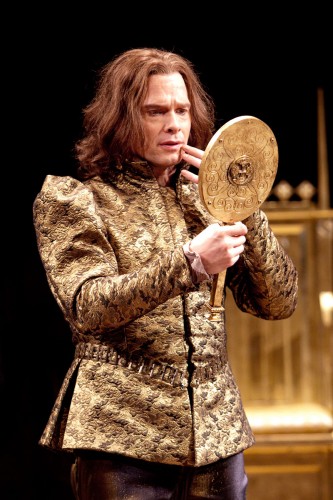 |
| photo: wikipedia.com |
formation. The reign of King Richard has set England on the track for a rapid decline, and all the characters are aware of this fact (except, maybe, the King himself). Virtually every cast member comments on Richard's blunders as King, saying their England is "full of weeds, her fairest flowers choked up" (3.4.34) and that Richard's "rash, fierce blaze of riot cannot last" (2.1.33). Amongst all this opposition for the King's decisions, a crisis of self formation and nationhood arises. Although the characters do not align themselves with Richard's choices, they remain steadfast in their devotion to the England of yore--and to their identities as Englishmen and women. Something weighty and powerful keeps these frustrated individuals firmly rooted in their English-ness. That something is memory.
 |
| Eddie Redmayne played King Richard at Donmar Warehouse's production in London, 2010 |
tradition, memory, and history. In an impassioned speech about King Richard's follies, John Gaunt claims that, "This land of such souls, this dear dear land, / Dear for her reputation through the world, / Is now leased out (I die pronouncing it) / Like a tenement or pelting farm" (2.1.57-60). Richard's lack of effort in his kingship so vehemently goes against tradition that it threatens to utterly transform England not just internally, but also externally in the way its reputation amongst other world powers will suffer. Though Gaunt communicates his love for his nation through romantic and nostalgic language, the implications of this speech unravel the very custom he claims to promote. Claiming that the King is not fit for his role is not only treasonous--it also goes against the longstanding precedents of kingship in England. In this way, memory and progression are placed in opposition throughout the play as the characters puzzle over which option will sustain England.
 |
| photo: welovedc.com |
I think you're right about Englishness trading on memory, which is another reason the history plays are so explicitly concerned with who or what is English. Besides Gaunt, York is another voice that warns what will happen to the institution of monarchy (relying as it does on memory) in the wake of Richard's seizure of Bolingbrook's inheritance and of regime change. It makes sense to connect this tendency toward conscious action on the basis of historical memory with time management, since lived time necessarily becomes remembered time (i.e. history). Great job of ambling through this idea-rich terrain.
ReplyDelete